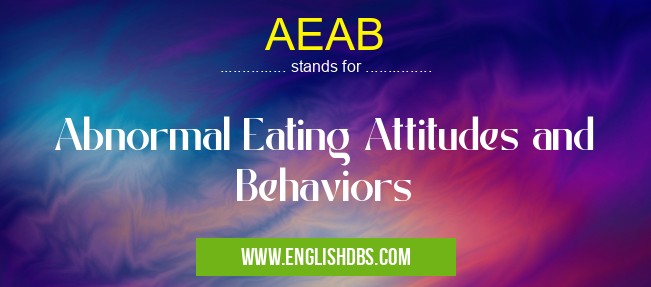What does AEAB mean in UNCLASSIFIED
AEAB (Abnormal Eating Attitudes and Behaviors) refers to a range of unhealthy thoughts, feelings, and behaviors related to food, eating, and body image. These behaviors can significantly impact physical and mental health, leading to severe consequences.

AEAB meaning in Unclassified in Miscellaneous
AEAB mostly used in an acronym Unclassified in Category Miscellaneous that means Abnormal Eating Attitudes and Behaviors
Shorthand: AEAB,
Full Form: Abnormal Eating Attitudes and Behaviors
For more information of "Abnormal Eating Attitudes and Behaviors", see the section below.
Definition
AEAB encompasses a spectrum of disordered eating behaviors, including:
- Anorexia nervosa: An eating disorder characterized by extreme weight loss, intense fear of gaining weight, and body image distortion.
- Bulimia nervosa: An eating disorder involving recurrent episodes of binge eating followed by compensatory behaviors (e.g., purging).
- Binge-eating disorder: An eating disorder characterized by frequent episodes of uncontrolled eating, accompanied by a feeling of loss of control.
- Other specified feeding or eating disorder (OSFED): A category for eating disorders that do not meet the full criteria for anorexia, bulimia, or binge-eating disorder.
Causes
The exact causes of AEAB are complex and multifactorial, but several contributing factors have been identified:
- Biological factors: Genetic predispositions, neurochemical imbalances, and hormonal changes.
- Psychological factors: Low self-esteem, body dissatisfaction, perfectionism, and anxiety.
- Environmental factors: Cultural pressures, societal expectations, and family dynamics.
Symptoms
Symptoms of AEAB can vary depending on the specific disorder but may include:
- Physical symptoms: Weight loss or gain, gastrointestinal problems, skin changes, and dental erosion.
- Emotional symptoms: Anxiety, depression, irritability, low self-esteem, and fear of gaining weight.
- Behavioral symptoms: Excessive dieting, binge eating, purging, or excessive exercise.
Consequences
AEAB can have severe physical and mental health consequences, including:
- Physical complications: Malnutrition, heart problems, gastrointestinal issues, and bone loss.
- Mental health issues: Depression, anxiety, and substance abuse.
- Social and academic problems: Isolation, relationship difficulties, and academic impairment.
Essential Questions and Answers on Abnormal Eating Attitudes and Behaviors in "MISCELLANEOUS»UNFILED"
What are Abnormal Eating Attitudes and Behaviors (AEAB)?
AEAB refers to a range of unhealthy eating habits and attitudes that can lead to significant physical, psychological, and social problems. They include behaviors such as excessive dieting, binge eating, purging, and restrictive eating.
What are the causes of AEAB?
AEAB can be influenced by a combination of factors, including societal pressure to conform to thinness ideals, genetic predisposition, traumatic experiences, and underlying mental health conditions.
What are the different types of AEAB? A: Common types of AEAB include: - Anorexia nervosa: Extreme food restriction and weight loss, intense fear of gaining weight - Bulimia nervos
Common types of AEAB include:
- Anorexia nervosa: Extreme food restriction and weight loss, intense fear of gaining weight
- Bulimia nervosa: Binge eating followed by purging (self-induced vomiting, laxative misuse)
- Binge-eating disorder: Frequent episodes of uncontrolled eating
- Other specified feeding or eating disorder (OSFED): Atypical eating behaviors that don't meet full criteria for specific disorders
What are the health risks associated with AEAB?
AEAB can lead to severe health consequences, including malnutrition, electrolyte imbalances, heart problems, osteoporosis, dental erosion, and reproductive issues.
How can I get help for AEAB?
If you or someone you know is struggling with AEAB, it's crucial to seek professional help. A qualified mental health professional can provide therapy, medication, and support to help individuals recover from these disorders.
Is it possible to recover from AEAB?
Yes, recovery from AEAB is possible with appropriate treatment and support. However, it requires significant effort, commitment, and the support of family, friends, and healthcare professionals.
Final Words: AEAB is a serious and complex issue that requires proper diagnosis, intervention, and treatment. Understanding the symptoms, causes, and consequences of AEAB is crucial for early detection and effective support for individuals struggling with these disorders. Seeking professional help from healthcare professionals specializing in eating disorders is essential for recovery and long-term well-being.
